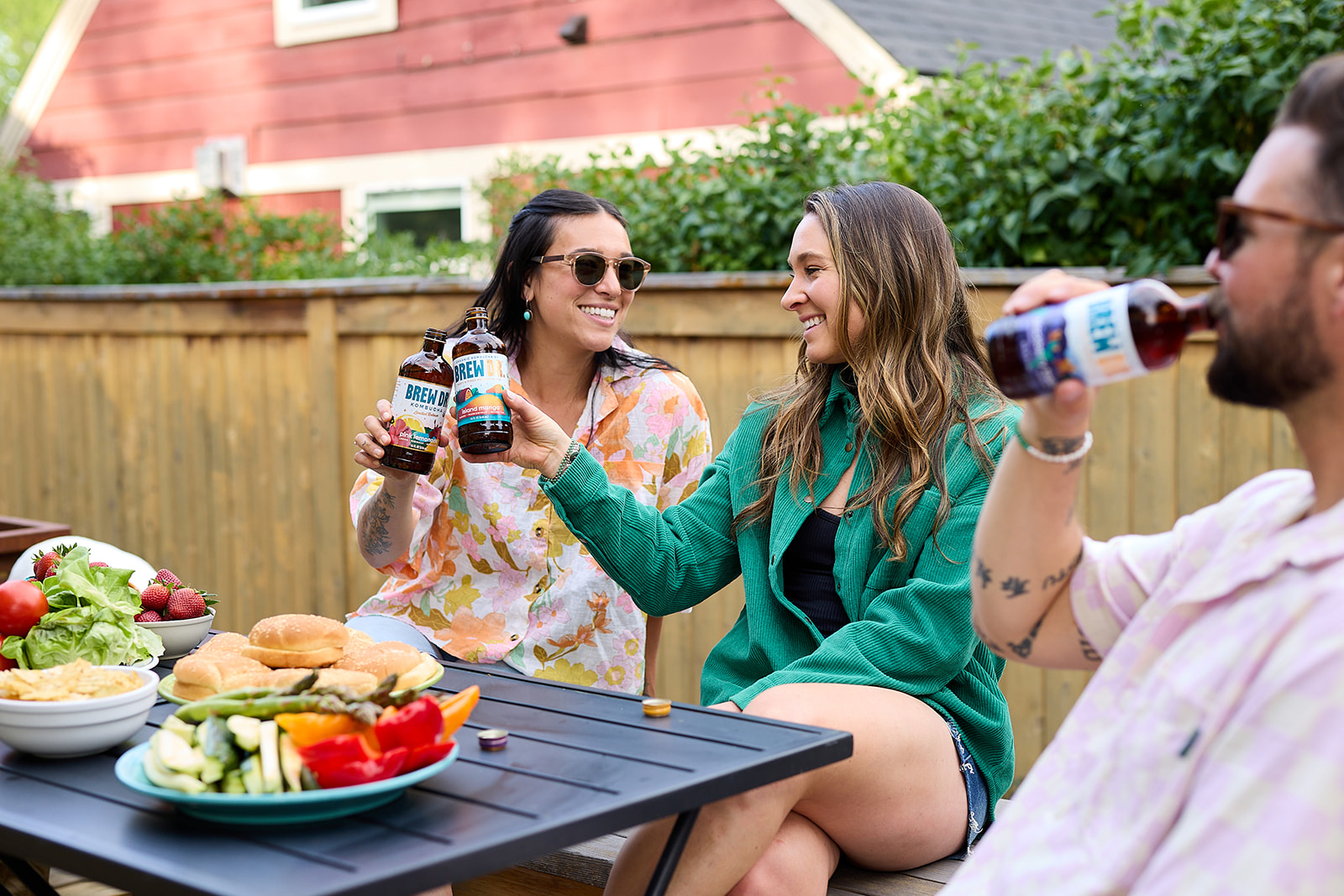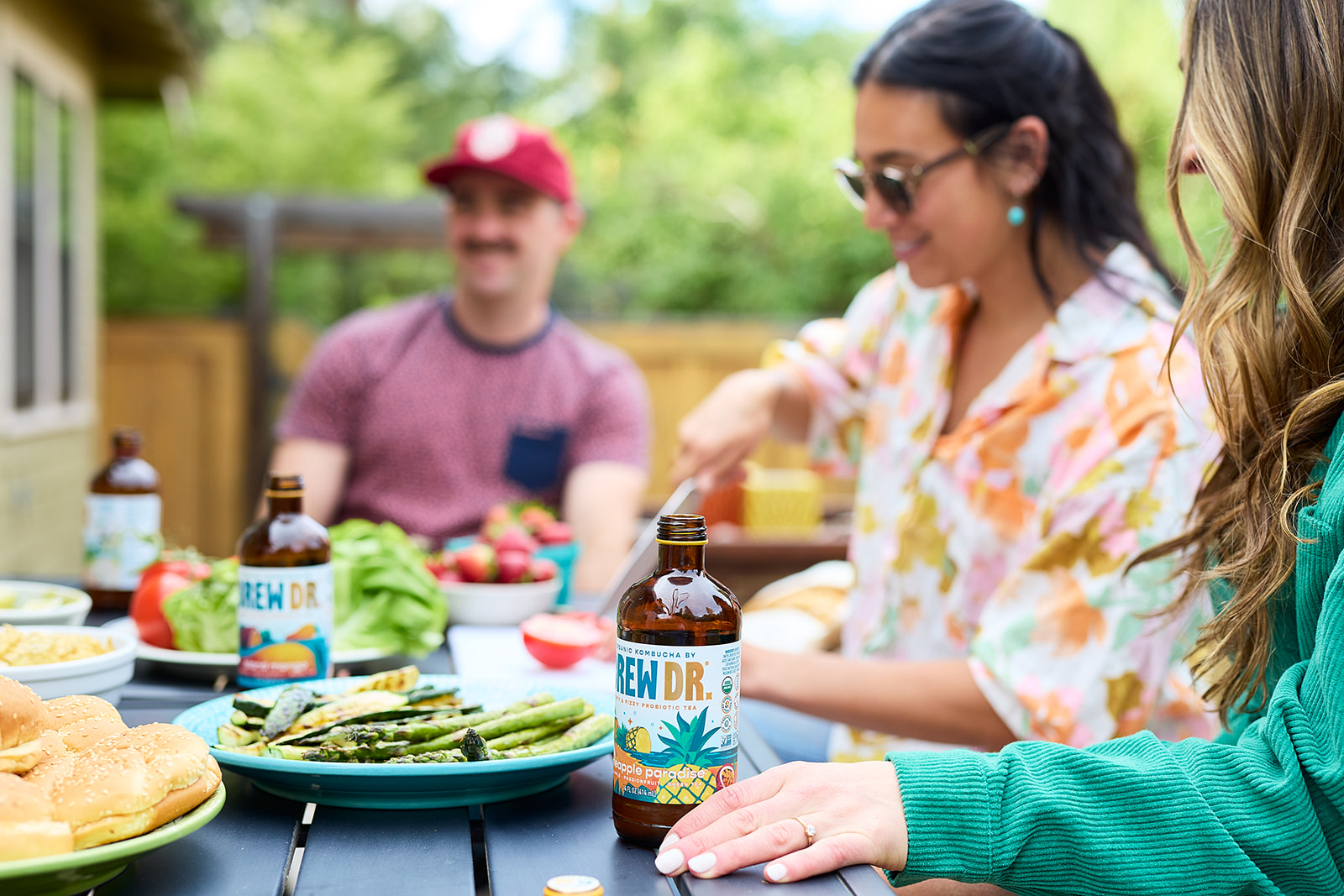When it comes to this ready-to-drink beverage, one of the more common questions is: does kombucha have alcohol? The short answer is yes, kombucha does contain some alcohol. However, Brew Dr. Kombucha removes the alcohol produced through fermentation to below 0.5% ABV to make it safe for everyone to consume.
Although the history of kombucha dates back thousands of years, this fermented beverage has become increasingly popular in the past decade, especially among people wanting to live a healthy lifestyle.
The health benefits of kombucha have been studied extensively in recent years and there are many ongoing studies to understand the role of probiotics. Some of these benefits may include improved digestion, a reduction in cholesterol, and better-controlled blood sugar levels. Its alcohol content, however, concerns some people. Does kombucha have alcohol in it? Why? Is it considered an alcoholic beverage?
In this article, we explore the alcohol content of kombucha and what that means for drinkers of this fermented treat.

Fermented beverages like kombucha are believed to have originated in China. Kombucha is created using black or green tea infused with certain strains of bacteria, yeast, and sugar. The mixture must then ferment for several weeks at room temperature.
The surface of the tea becomes covered with a mushroom-like film formed by bacteria and yeast during fermentation. This film is an example of a living "symbiotic colony of bacteria and yeast," also known as a SCOBY.
As a result of the fermentation process, kombucha has unique flavor and characteristics. It contains carbon dioxide, alcohol, acetic acid, and other acidic compounds, along with probiotic bacteria.
When it comes to this ready-to-drink beverage, one of the more common questions is: does kombucha have alcohol? The short answer is yes, kombucha does contain some alcohol. However, it isn't technically considered an alcoholic beverage.
We know it sounds confusing, so let’s walk through the answer so you can better understand the process and make an informed decision on whether kombucha is right for you.
It's important to understand that kombucha is not brewed to be intentionally intoxicating (although some more alcoholic kombuchas are emerging in the market). However, commercial kombuchas do have varying amounts of alcohol. This alcohol is naturally occuring and not added. This is because a small amount of alcohol is produced as a byproduct of the natural fermentation process of kombucha. After fermentation, brewers can even reduce alcohol levels using a variety of techniques. Still, the actual alcohol level varies depending on a few factors.

Kombucha is a fermented beverage, so it produces some alcohol during the fermentation process. The alcohol in the final product results from yeast consuming and fermenting sugar into CO2 and ethanol. The trace amount of alcohol in kombucha varies from brew to brew since genuine kombucha is naturally fermented without being pasteurized.
So, what we're saying here is that alcohol naturally occurs during the brewing process and can't be avoided. All fermented foods, such as vinegar, sauerkraut, kefir, and soy sauce, contain some alcohol. Kombucha falls into this category as well.
The alcohol content of kombucha can vary between brands. Homemade kombucha is likely to have a higher alcohol content, so beware when making it or you might just end up with a vinegary moonshine. Since each type of kombucha is made differently, be sure to check the label to make sure you are drinking unpasteurized, organic kombucha. For context, dairy-based kefir contains similar amounts of alcohol, again, a byproduct of natural fermentation.
Keep in mind that the length of the brew will affect the alcohol content. The longer kombucha ferments, the longer it has to produce alcohol. The type of yeasts in kombucha also impacts the level of alcohol. Yeast that can ferment at lower temperatures will produce a lower-alcohol brew.
Lastly, there are various methods for removing alcohol from brewed kombucha to ensure the final product is legally non-alcoholic and safe for all ages to enjoy.

In a nutshell, the answer is no. It is unlikely that you will get drunk from drinking a lot of kombucha. Even at the legally non-alcoholic maximum of 0.5% ABV, it would be very difficult.
In fact, an increasing number of people are switching the bubbly, beer, or cocktails for kombucha lately, for a tasty treat without an alcohol buzz. Give it a try and see how you feel!
However, if you are particularly sensitive to alcohol or have religious or health reasons for avoiding it, you should keep in mind that there are small amounts in the final product. We hope this information helps you make an informed decision about whether kombucha is right for you.
Commercially produced kombucha must contain less than 0.5% alcohol in order to be sold as a non-alcoholic beverage. At these levels, you'd have to drink many bottles of kombucha in a short period of time to feel any effects of the alcohol.
We use a method of non-heat distillation to remove alcohol from our kombucha without harming the live and active cultures. This means we can keep our product raw and authentic while preserving the beneficial bacteria. Our final bottled kombucha has around 0.1% ABV, well below the required 0.5%.

If you have any medical concerns about consuming alcohol or fermented foods, we recommend chatting with your doctor before trying kombucha. While the naturally occurring alcohol content of commercial kombucha is extremely low, a doctor can help address any specific concerns you may still have. In addition, remember that despite the very low alcohol content level, you may consider diluting kombucha for little ones who enjoy this tasty treat, if only to decrease the fermented flavor.
We hope this helped answer some of your questions on alcohol and kombucha. Next time you drink Brew Dr. Kombucha, sip with confidence knowing you're getting all of the goodness you want and none of the buzz you don't!
Looking for Brew Dr. Kombucha near you? Find a store today.
